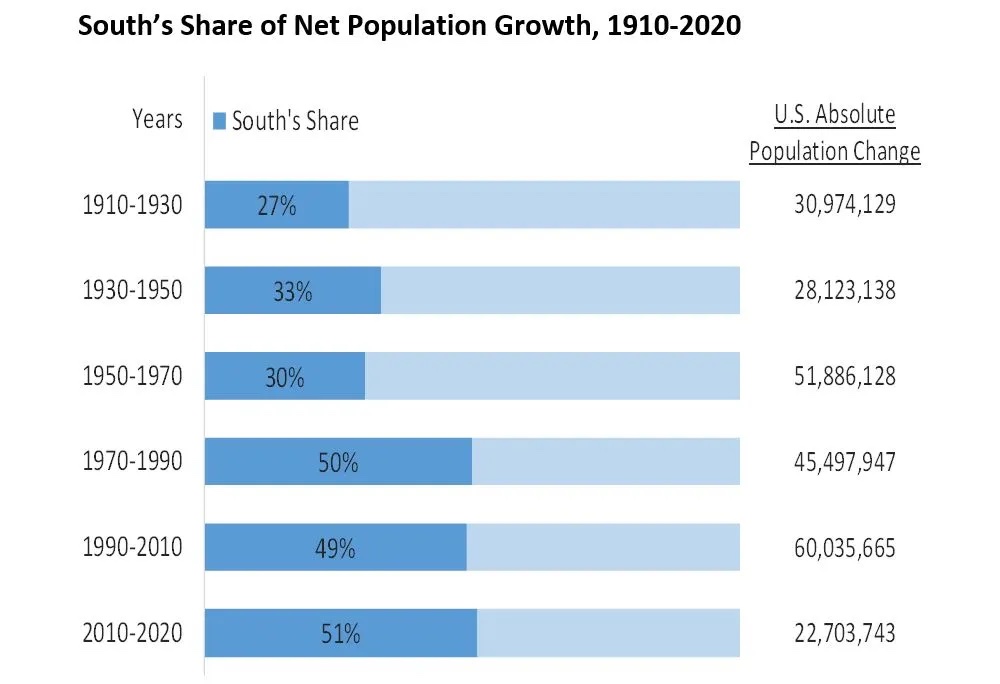Multiple Southern states with large rural areas are now popular destinations for both migration and business development.
Newcomers driving population growth constitute an increasingly diverse pool of talent that will propel these economies forward.

In North Carolina, state commerce officials have successfully recruited six major firms that will create an estimated 18,000 new jobs by 2030, earning North Carolina the reputation as the best place in the country to do business. Other Southern states placed in the ranking, including Virginia in third, Texas and Tennessee, in fifth and sixth respectively, Georgia at number 10, followed by Florida at number 11.
The South has been attracting the largest share of net population growth in the U.S. over the past five decades (see the graph above).
The South is the dominant region for population gain from all regions of the country, with the Western region lagging much further behind, using the latest data from the Census Bureau, April 1, 2020 – July 1, 2021. Significant increases occurred due to increased migration patterns during COVID-19 outbreaks, when pandemic refugees left the larger cities in the Northeast to spread out in the more rural South.
The Southern states’ share of the growth over the past decade, ending in 2020, is shown in Figure 3, where five top migrant states – Texas, Florida, Georgia, North Carolina, and Virginia – garner 79% of the growth to the South. Those same states ranked in the top 11 best places to do business.


Within the migration trends by region, there are major changes in the racial composition behind the Southern growth.


Using the U.S. Census American Community Survey 2018 five-year estimates, the Southern states with the most rural population are: Mississippi (sixth in the U.S. in rural population), Kentucky (ninth), Arkansas (11th), West Virginia and Oklahoma (13th). But across the South, rural counties continue to attract business and industry, especially those in proximity to more urban areas. Case in point is the North Carolina example where one rural county has attracted mega-employers that will create robust supply chains with opportunities for smaller businesses.
To ensure that these states have a diverse pool of entrepreneurs and that small business owners have equitable access to business opportunities undergirding the newfound prosperity arriving through population shifts, there is an urgent need to reassess the capabilities of local entrepreneurial and small business ecosystems. We recently completed such an assessment of a rural county hosting several of North Carolina’s newly recruited businesses.
Nearly everyone we interviewed said the entrepreneurial ecosystem was underdeveloped and difficult to navigate. Minority entrepreneurs said they encounter difficulties accessing existing small business assistance resources, are disadvantaged by gaps in the ecosystem, and distrust local government and entrepreneurial support organizations.
Rural local governments must commit to a place-based community economic development approach to develop inclusive entrepreneurship and small business ecosystems. Specifically, local governments should:
- Conduct a comprehensive audit of existing government policies, regulations, procedures, and practices to identify barriers that disadvantage historically under-represented entrepreneurs and small business owners in the local community.
- Develop an inventory of existing resources, break down silos, build connections, and fill revealed gaps in the existing entrepreneurial and small business ecosystem.
- Build a dedicated website—a one-stop digital entrepreneurial hub–that connects local entrepreneurs and small business owners to entrepreneurial support organizations and other resources, including diverse sources of capital, needed to create, grow, maintain, and sustain thriving businesses and communities.
- Adopt a mission-driven innovation approach to small business development. Direct aspiring minority entrepreneurs and small business owners to specific opportunities and challenges that require small business solutions.
- Use contracting and procurement forecasts to provide minority entrepreneurs with keen insights into where propitious entrepreneurial and business development opportunities exist in the County.
- Leverage local government procurement and contracting opportunities to grow minority businesses and encourage existing anchor employers as well as newly recruited businesses to leverage their supply chains to facilitate homegrown minority business development.
- Create accessible makers’ spaces, incubators, accelerators, and coworking spaces with open doors for historically marginalized groups and communities who need access to both intellectual and financial capital to launch, grow, and sustain successful business enterprises.
- Sponsor start-up innovation challenges or reverse pitch competitions in historically marginalized communities to market and generate minority interest in forecasted contracting and procurement opportunities.
- Invest in an inclusive supply chain e-procurement platform to connect minority entrepreneurs and small business owners with education, training, and networking as well as access to government and private sector contracting and procurement opportunities.
- Launch Equitable Development Venture Funds dedicated to providing start-up and growth capital to support minority-owned, mission-driven entrepreneurial ventures and small business enterprises.
- Establish a multi-channel communications system and partner with reputable organizations in minority communities to ensure that information flow regarding available entrepreneurial supports and resources as well as business opportunities are disseminated via a trusted messenger/trusted messaging system.
- Invest in impact investment training so that moving forward all stakeholders in the local entrepreneurial ecosystem understand the diverse pools of capital and equity tools available to promote and facilitate minority business development – and inclusive and equitable, place-based community economic development more generally.
Adopting and successfully implementing these recommendations should create equitable opportunities for African Americans, Hispanics, and other historically marginalized groups that are growing demographics to leverage their entrepreneurial aspirations in the local booming marketplace—thus making Southern States with significant rural opportunities a more inclusive place to live, work, play, and do business.
This article first appeared on The Daily Yonder and is republished here under a Creative Commons license.
James H. Johnson, Jr. is a William Rand Kenan, Jr. Distinguished Professor of Strategy & Entrepreneurship at the University of North Carolina at Chapel Hill's Kenan-Flagler Business School.
Jeanne Milliken Bonds is a Professor of Practice, Impact Investment, and Sustainable Finance at the University of North Carolina at Chapel Hill's Kenan-Flagler Business School. She is a former mayor and was previously with the Federal Reserve.
Wendell M. Davis is a retired chief executive officer from local government and former chief financial officer in higher education. He is currently the managing principal and owner of Sixty-Revolutions (SR/365) LLC, a management consulting practice focused on helping organizations develop best practices.





